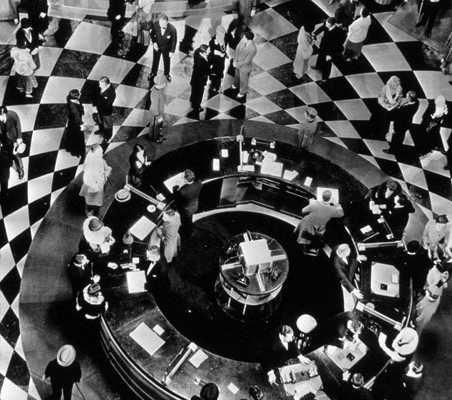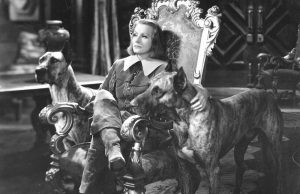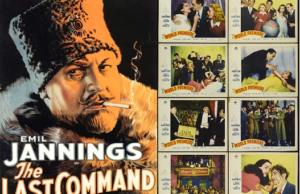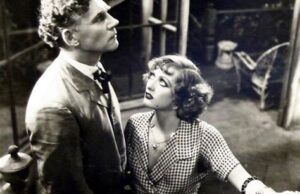Grand Hotel (1932)
By Toronto Film Society on June 26, 2014
Toronto Film Society presented Grand Hotel (1932) on Monday, February 2, 1981 in a double bill with Mutiny on the Bounty as part of the Season 33 Monday Evening Film Buff Series, Programme 6.
Metro-Goldwyn-Mayer was established in 1924, with Louis B. Mayer as head of the studio and Irving Thalberg in charge of production. As part of a financial empire with powerful banking affiliations and a ready-made market in the form of Marcus Loew’s extensive chain of motion picture theatres, MGM grew and prospered rapidly. By the early 30s it was the biggest and richest Hollywood studio, a film factory of unequaled prestige and unprecedented glamour. With generous budgets at their disposal, Mayer and Thalberg could achieve for their product a technical polish that no other studio could consistently match. During its peak years, in the 30s and early 40s, the MGM roster included many of the most accomplished creative artists, technicians, and stars in the business. Art director Cedric Gibbons became famous for his sumptuous, elegant sets; costume designer Gilbert Adrian created gowns that influenced the fashions of the times; sound engineer Douglas Shearer (brother of Norma) was the most ingenious technician in the business. Cameramen like William Daniels, George Folsey, Karl Freund, Joseph Ruttenberg, and Harold Rosson created brilliant images in high-key lighting which became the studio’s trademark. Among the directors who passed through the studio gates were such artists as John Ford, Von Stroheim, King Vidor, Fritz Lang, Ernst Lubitsch, Victor Seastrom, and Gregory La Cava. But the MGM style was more characteristically represented by the polished craftsmanship of such directors as Clarence Brown, Sidney Franklin, George Cukor, Jack Conway, Victor Fleming and W.S. Van Dyke. At the heart of the MGM glamour factory was its impressive company of stars. The studio boasted “more stars than there are in the heavens”; the impressive array including such names as Greta Garbo, Clark Gable, the Barrymores, Jean Harlow, Joan Crawford, Spencer Tracy, Norma Shearer, Robert Taylor, James Stewart, Nelson Eddy, Jeanette MacDonald, Myrna Loy, Mickey Rooney, Judy Garland, William Powell, Greer Garson, Walter Pidgeon, and Elizabeth Taylor.
“Metro-Goldwyn-Mayer’s and Edmund Goulding’s production of Vicki Baum’s novel and stage play, Grand Hotel, ranks, for a number of reasons, as one of the most conspicuous breakthrough movies ever made. It was a prime example of how to make profitable use of the rich and increasingly attractive multi-star facilities of Hollywood, especially those of its largest and most opulent studio, MGM. Into it the studio threw a platoon of top performers, including Greta Garbo, Wallace Beery and John Barrymore. It mingled a motley assortment of interesting characters in a rigidly circumscribed location, wherein to reveal their various character traits and, within a limited time, resolve their problems or be propelled toward their destinies. And it proved that the multiple-story format, which had seen service in novels and plays, could be more swiftly manipulated on the ever more flexible screen without confusing the audience’s attention by its shifting story lines.
“Here, in this creative venture, the smoothly rolling cameras had the range of the multiple locations within a Berlin grand hotel–the telephone switchboard, which was focused as a sort of nerve center at the start; the elaborate and always busy lobby and reception desk; the upstairs halls and various guest rooms where most of the intimate dramatic action took place. And through the new conceptions of cutting, the flow was smooth, the cuts were sharp, and the whole production was given an uncommon and electrifying pace.
“…As one can see, the thrust of these small dramas was to point up the ironies of life, the unsuspected and bizarre twists of fortune and fate that may occur without others being aware of them in a grand hotel. To be sure, they were rather obvious, shallow, and contrived, but the characters involved were engrossing and, in general, very well played.
“Most conspicuous, of course, was Garbo, whose conveyance of a Russian temperament, the dark moods and suddenly soaring spirits of an international ballet star was tremendously impressive when first seen. She still is today.”
Reruns by Bosley Crowther, G.P. Putnam, New York
You may also like...
-
News

Frances Blau
Toronto Film Society | February 27, 2024On Monday, February 26th, 2024, Toronto Film Society lost longtime friend, supporter, and board member Frances Blau. Known for her sense of humour, her love of film, her generosity,...
-
Special Events

The Ladykillers (1955) at the Paradise Theatre
Toronto Film Society | March 9, 2024Toronto Film Society presents Targets (1968) at the Paradise Theatre on Sunday, April 7, 2024 at 2:30 p.m. Ealing Studios arguably reached its peak with this wonderfully hilarious and...
Programming

Virtual Saturday Night at the Movies
Toronto Film Society | April 11, 2024Toronto Film Society is back in the theatre! However, we’re still pleased to continue to bring you films straight to your home! Beginning Season 73 until now we have...
4-
 Toronto Film Society | March 9, 2024
Toronto Film Society | March 9, 2024
-
 Toronto Film Society | November 6, 2022
Toronto Film Society | November 6, 2022
-
 Toronto Film Society | August 1, 2023
Toronto Film Society | August 1, 2023
Donate to Toronto Film Society – We’re now a Registered Charity!
-
Copyright © 2017 Toronto Film Society.








Leave a Reply